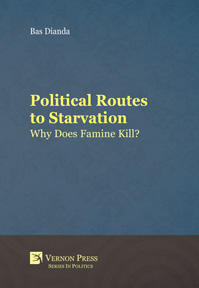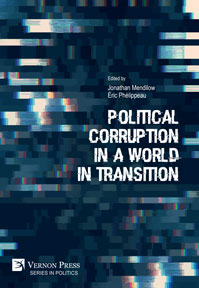Guardians of Peace: The Civilian Joint Task Force in Countering Boko Haram in Borno State, Nigeria
by Seun Bamidele (University of Johannesburg, South Africa / Federal University Oye-Ekiti, Nigeria)
Purchase this book
(click here to change currency)
Postcolonial instability in Africa has produced a wealth of literature on peace and conflict, including Boko Haram, a notorious insurgency group in northeastern Nigeria. However, we rarely find a book devoted to counter-insurgency peacekeeping by an irregular civilian movement that was untrained for warfare. Dr Bamidele’s book is unique for empirically examining how the militarisation of the Civilian Joint Task Force contributes to peacekeeping in Nigeria’s Borno State. It presents a nuanced analysis of counter-insurgency from below, which illuminates thorny issues in civilian-military alliances, such as funding, liaison, and human rights violations. The policy insights in the book provide a platform for integrating informal counter-insurgency groups into the State’s security architecture. In this alone, Dr Bamidele fills a critical gap in peace and conflict literature in sub-Saharan Africa.
Professor Dr. Anthony C. Diala
Law Faculty
University of the Western Cape, South Africa
After reading Seun Bamidele's “Guardians of Peace: Civilian Joint Task Force in Countering Boko Haram in Borno State, Nigeria,” it became quite evident to me that he has achieved in unearthing what linguists refer to as the "inevitable anomalies of So-Seem-Said." In this case, the economic, political, religious and social institutions in Nigeria are thoroughly broached apropos thought and reality. The "So-Seem-Said" triad in the book entails (1) how Nigeria's economic, political, religious and social institutions exist interdependently; (2) how the institutions appear to the various groups in the country, regardless of their autonomy; and (3) how we must talk about the institutions, no matter what or whether we think about them or how they really exist.
Prof. Dr. Abdul Karim Bangura
American University's Center for Global Peace, Washington DC
This book offers a new lens on insurgency-related peace, focusing on the critical role of local initiatives in addressing violent extremism. It centers on the Civilian Joint Task Force (CJTF), a community-based peace group formed in Borno State, Nigeria, in response to the atrocities of Boko Haram. With over 26,000 members, the CJTF has become a significant player in the fight against Boko Haram, working closely with the military across both urban and rural areas. Using a qualitative ethnographic approach, the book challenges the traditional view that insurgency-related peace efforts are solely the responsibility of the state or conventional security forces. It highlights how local, non-state actors like the CJTF contribute effectively to security and peacebuilding, shedding light on the complexities of civilian-military collaboration. Drawing on David Galula’s insurgency theory, the book examines the CJTF’s role in combating Islamic extremism and demonstrates that local peace movements can complement state-led efforts. This analysis fills a critical gap in the literature, offering a unique contribution to the fields of security studies, peacebuilding, and African politics. Ideal for scholars, policymakers, and practitioners interested in alternative peace strategies, community-driven security, and the challenges of countering extremism, this book provides a comprehensive framework for understanding how local and state efforts can work together to achieve lasting peace. It offers practical insights into the evolving nature of insurgency-related peace and its implications for Nigeria and beyond.
LIST OF FIGURES
FOREWORD
Jonathan S. Maiangwa
University of Maiduguri, Nigeria
FOREWORD
Jimam T. Lar
University of Jos, Plateau State, Nigeria
PREFACE
ACKNOWLEDGEMENTS
INTRODUCTION
CHAPTER ONE
INTRODUCTION: CIVILIAN JOINT TASK FORCE’S INSURGENCY-RELATED PEACE OPERATIONS IN BORNO STATE
CHAPTER TWO
KEY CONCEPTS
CHAPTER THREE
THEORETICAL AND EMPIRICAL APPROACHES TO INSURGENT PEACE
CHAPTER FOUR
BOKO HARAM AND LOCAL SECURITY CHALLENGES IN BORNO STATE
CHAPTER FIVE
THE STATE SECURITY ARCHITECTURE IN BORNO STATE, NIGERIA
CHAPTER SIX
THE HISTORY OF THE CIVILIAN JOINT TASK FORCE IN BORNO STATE
CHAPTER SEVEN
ORGANISATIONAL STRUCTURE AND OPERATIONAL STRATEGIES OF THE CIVILIAN JOINT TASK FORCE
CHAPTER EIGHT
CIVILIAN JOINT TASK FORCE’S INTERVENTIONISM AND INSURGENT PEACE IN BORNO STATE
CHAPTER NINE
ASSESSMENT OF CIVILIAN JOINT TASK FORCE’S EFFECTIVENESS
CHAPTER TEN
CHALLENGES TO THE CIVILIAN JOINT TASK FORCE’S IMPLEMENTATION OF NIGERIA’S LOCAL SECURITY POLICY
CHAPTER ELEVEN
CONCLUSION AND RECAPTURING
BIBLIOGRAPHY
Dr. Seun Bamidele has devoted over ten years of his career to the fields of conflict, security, and development studies, with a specialized focus on local security, insurgency, counterinsurgency, and community security. His academic and professional journey integrates research, policy-making, and university teaching, allowing him to develop a nuanced understanding of the social structures and processes contributing to vulnerability in conflict zones. His expertise is particularly centered on West Africa, with a primary focus on Nigeria.
Dr. Bamidele holds two PhDs: one in Peace and Security Studies from the Institute of Peace, Security, and Governance at Ekiti State University, and another in Development Studies from the University of Pretoria, South Africa. He has consulted for various international organizations, including the United Nations Development Programme (UNDP). Currently, he serves as a lecturer and researcher at the Department of Peace and Conflict Studies, Federal University Oye-Ekiti, Nigeria.
His research interests center on the potential of local insurgency-related peace groups, particularly the Civilian Joint Task Force (CJTF) in Nigeria, and their collaboration with government military forces. Dr. Bamidele applies David Galula’s insurgency-related peace theory to analyze unconventional peace strategies and military-civilian cooperation. His work has been published in numerous peer-reviewed journals, including the ‘Journal of Asian and African Studies,’ ‘Development Studies Review,’ and ‘African Conflict and Peacebuilding Review.’
Dr. Seun Bamidele was born in Oyo State, Nigeria, and his upbringing in the country deeply informs his analytical perspective. His research has been further enriched by fieldwork during his post-doctoral research funded by the Gerda Henkel Stiftung in Germany.
Insurgency-related peace, Civilian Joint Task Force (CJTF), Boko Haram, community-led security, local insurgency, counterinsurgency, ethnographic research, civilian-military cooperation, unconventional peace strategies, David Galula's theory, peacebuilding in conflict zones, Nigerian security architecture, extremism, community defense, local governance, grassroots peace initiatives, insurgency dynamics, Islamic extremism, security sector reform, non-traditional security groups, insurgency cooperation, peace interventions, Borno State, local security initiatives, civilian defense forces, counterinsurgency strategies, military-civilian collaboration, social resilience, security intelligence, conflict resolution theory, state sovereignty, insurgent groups in Africa
See also
Bibliographic Information
Book Title
Guardians of Peace: The Civilian Joint Task Force in Countering Boko Haram in Borno State, Nigeria
ISBN
979-8-8819-0210-0
Edition
1st
Number of pages
222
Physical size
236mm x 160mm








